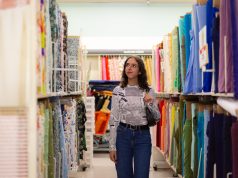The pandemic has caused businesses to close and buses to limit service across the United States. The result is that it’s harder for many people to get food. One key to beating systemic food insecurity is urban gardens and community involvement. The Overtown Green Haven Project, founded by David Michael and Jorge Palacios, has been giving out free boxes of produce to locals since long before the coronavirus appeared in Wuhan.
“People are either jobless at this point in time, or the places that they’ve been working for have to cut hours,” said Michael. “Of course naturally what winds up happening is things get backed up, people can’t pay rent, they have to micromanage the few funds that are coming in, so [they] need food.”
The garden has been giving nourishment to locals for more than a year. Overtown has a high number of households without vehicles and more than a half-mile from a supermarket – a food desert – according to the United States Department of Agriculture, (USDA) food access research atlas.
The USDA defines a food desert as “an area where people have limited access to a variety of healthy and affordable food.” Lack of access to healthy food is a multidimensional problem. It leads to codependency on supermarkets — wherein individuals have to solely rely on businesses for food, rather than being able to cultivate some of their own — and a lack of nutrition, which leads to a greater risk of health problems.
Food insecurity is among one of the most important nutrition-related public health issues, and the effects vary with age. There are cognitive problems in children and trouble fulfilling daily tasks in seniors, according to ‘The Economics of Food Insecurity in the United States’, a 2011 article written by various professors of economics.
The Overtown Green Haven Project also works with Grow Roots Miami, a food justice collaboration that also focuses on other community programs such as providing education about garden maintenance and supporting and mentoring young Black, POC, queer, trans and female farmworkers.
Grow Roots Miami actively helps build food-producing gardens for families in need. Most of their recent focus has been on those that are in food deserts — a problem that disproportionately affects low-income households — and impacted by COVID-19, implementing community gardens, compost projects and food distribution. They also emphasize helping those that have been “historically and continuously marginalized and harmed by systemic injustice.”
“They’re spraying all kinds of chemicals, pesticides, and herbicides on these fruits and vegetables, and now you’re digesting it and feeding it to your children, and that’s not cool either,” said Michael. “Everything is hands-on. We don’t spray anything on our crops and it’s just the old school vibe of growing things.”
To resist being dependent on corporations in their community, Jenny Lara and Juan Cruz Padilla, founders of Bosque Medicine Farm in Portland, Oregon, teach locals in their area about food sovereignty and ways for individuals to grow some of the food they eat at home.
Food sovereignty is described as the right of the people to create their own agricultural systems and produce their own food, according to the Declaration of Nyeleni, the first global forum on food sovereignty in 2007. “Our capacities to produce healthy, good and abundant food are being threatened and undermined by neoliberalism and global capitalism,” the document reads.
Lara said that food sovereignty means being able to feel empowered to reclaim your health and livelihood. “It doesn’t necessarily mean having access to a Whole Foods, but having access to seeds and you can have a community lot,” she said. “[It means] not having to rely on the corporations to get fed.”
Despite being on opposite coasts, Michael, Cruz Padilla and Lara all agree that the benefits of gardening extend beyond food accessibility and superior quality of food.
“Gardening is a practice that lowers anxiety. It gets me connected to what matters in life,” said Cruz Padilla.
“You value food a lot more,” Lara said. It is more gratifying to watch food go from farm to table and to build a community around food and trading it with neighbors.
Social distancing increases limitations on mobility and transportation, making it more difficult to access food, according to Feeding America. In a worst-case scenario, they expect that over 17 million more individuals will experience food insecurity, depending on how high the unemployment and poverty rate reach.
Michael advises those who find themselves in a food desert to start talking to their local officials.
“That’s where it all starts, we really need to start holding these local officials accountable. . . to make sure that the people are getting services that they need,” he said. “They’re the ones that are shifting the money around, and taking away money from programs to put it god knows where.”
Michael has been especially active during the pandemic, participating in food pantries and collaborating with other organizations to pass out boxes of fresh produce and dairy products.
Education is at the forefront of the war against food insecurity. Urban gardens provide not just a way for locals to receive healthy, accessible food, but they also create ways to teach individuals about gardening and how to take care of their own plants, a useful skill if they were to find themselves in another food desert with no community garden.
“If people just wanted to learn about getting their hands dirty, learn how to maintain a garden, or if they wanted to learn how to grow specific plants or trees they’d be able to learn that too,” said Michael. “In the end, it’s just about helping the community.”

































